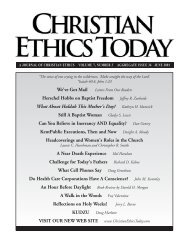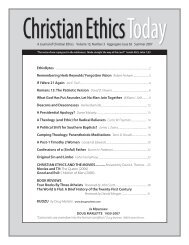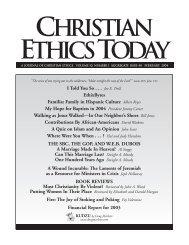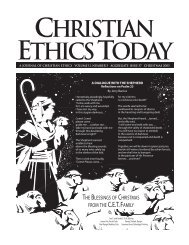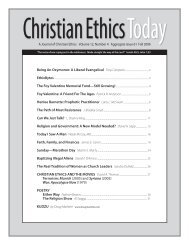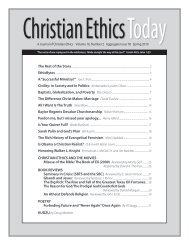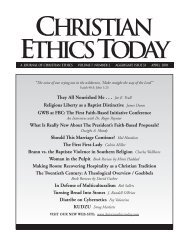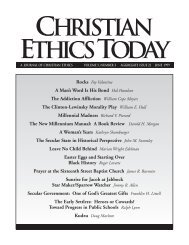Issue 032 PDF Version - Christian Ethics Today
Issue 032 PDF Version - Christian Ethics Today
Issue 032 PDF Version - Christian Ethics Today
You also want an ePaper? Increase the reach of your titles
YUMPU automatically turns print PDFs into web optimized ePapers that Google loves.
Two Cultural Addictions: Tobacco and Prayer<br />
© 2000<br />
By Dwight A. Moody, Dean of the Chapel<br />
Georgetown College, Georgetown, KY<br />
It is not easy being a minister in a tobacco state. A month<br />
after I became the pastor of a west Kentucky church, a well<br />
meaning member sidled up to me and said, “Be careful what<br />
you say about tobacco; we have some prominent tobacco<br />
farmers in our church.”<br />
Such warnings give pause; they slow down a preacher’s<br />
headlong pursuit of the prophet’s mantle.<br />
The truth of the matter is this: churches in Kentucky are<br />
addicted to tobacco, tobacco money, that is. I grew up in<br />
such a church. Tithes and offerings from the sale of tobacco<br />
funded the budget that included my father’s salary. While<br />
youth leaders lectured us about smoking, and lighting up was<br />
certainly taboo in our youth group, the congregation as a<br />
whole went right on preaching and singing, building and<br />
borrowing based on the substantial flow of money from the<br />
sale of tobacco.<br />
It wasn’t just the growers. It was landowners who rented<br />
ground, warehousers who hosted sales, investors who bought<br />
stock, and merchants who stocked shelves. It was night clerks<br />
at convenient stores eking out a living selling packs and cartons<br />
to one and all. Banks loaning money, governments collecting<br />
taxes, hospitals treating tobacco addicted patients and<br />
billing insurance companies and Medicare: it touched every<br />
arena of life.<br />
The entire economy, the whole of our culture is addicted,<br />
in this sense, to tobacco.<br />
The public sign of sickness is, of course, smoking. And<br />
smoking, as we know, is pervasive; it is an epidemic. Every<br />
year, in Kentucky and Indiana, 52,000 children and<br />
teenagers begin smoking. Every year, 18,000 residents of<br />
Kentucky and Indiana die from tobacco related causes.<br />
Public health officials contend it is one of the chief preventable<br />
causes of illness and death in America.<br />
What can we do?<br />
Our strategy has been shame. Years ago, it was shaming<br />
the individual, pointing a finger and speaking of the<br />
immorality of the smokers life. “Your body is the temple of<br />
God; do not desecrate it with the deadly poison.”<br />
These days, it is shaming the companies who market the<br />
stuff, holding press conferences or launching law suits to say,<br />
“You are deceiving the children and filling the earth with<br />
death.”<br />
There is nothing wrong with such shame; and speaking to<br />
these two groups (individual smokers and tobacco compa-<br />
14 • FEBRUARY 2001 • CHRISTIAN ETHICS TODAY<br />
nies) is entirely appropriate. But they represent only a small<br />
percentage of the American public that is caught up in this<br />
web of addiction.<br />
One reason this two-pronged campaign of shame has<br />
failed is because it leaves out so much of this cultural web. In<br />
the middle are all those who profit from the sale of tobacco,<br />
from churches and their consecrated and disciplined members,<br />
to governments and their noble and necessary projects<br />
for the public good.<br />
A second reason the campaign of shame has failed is that<br />
it features the pure, the righteous, the morally indignant<br />
pointing fingers at the unclean, the sinner, the moral reprobate.<br />
Little in our experience, and nothing in our spirit, leads<br />
us to believe such tactics will succeed in effecting the conversion<br />
for which we pray.<br />
Remember the old song, “not the preacher, not the deacon,<br />
but it’s me O Lord, standing in the need of prayer”?<br />
Conversion begins in the soul of the addict, at the point<br />
of desperation, when all else fails. Isn’t this the miracle<br />
method of that great book of the century, Alcoholics<br />
Anonymous? Isn’t this number one on that twelve step path to<br />
recovery, and wholeness, and salvation? “My name is Joe and<br />
I am an alcoholic.”<br />
The institutions, corporations, and organizations of our<br />
good land need a new confession: “My name is First Baptist<br />
church, and I am addicted to tobacco. My name is Kroger,<br />
and I am addicted to tobacco. My name is Memorial County<br />
hospital, and I am addicted to tobacco. My name is the<br />
Commonwealth of Kentucky, and I am addicted to tobacco.”<br />
It is not a strategy of shame, but of rejecting the centuries<br />
of denial, of refusing to blame others for our own responsibility,<br />
of refusing to name as scapegoats those who are most<br />
vulnerable, most visible, or most able to cough up big money.<br />
We are all in this together, and until we sing some version of<br />
that old spiritual, there will be no answer to our prayers for a<br />
drug free society.<br />
One Hell of a Prayer<br />
All the talk about prayer, high school football, and the<br />
Supreme Court reminds me of my own episode with<br />
such things thirty-two years ago. The year was 1968 and I<br />
was an 18 year-old senior at Hazelwood High School in suburban<br />
St. Louis. It was, they told us, the largest high school in<br />
the state.



